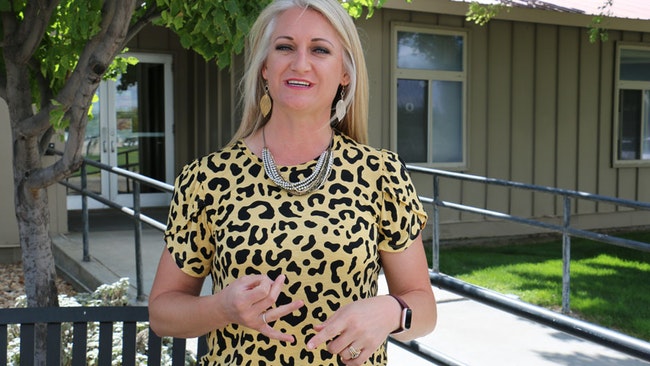
Vale School District Superintendent Alisha McBride said her staff will monitor the engagement level of students frequently as schools drop into an online learning paradigm this year. (The Enterprise/Pat Caldwell).
EDITOR’S NOTE: This article was produced in partnership with the Solutions Journalism Network as part of the Enterprise’s effort to take a fresh approach to reporting on community issues.
VALE – A shift to online learning by schools in Malheur County creates a challenge for parents who often do not have the time, tools or experience to keep their children engaged but there are useful, easy methods to keeps kids focused.
Schools shifted to distance learning last spring when Oregon authorities shut down schools in March. Now, most local schools are returning to what is called comprehensive distance learning, again requiring teachers, students and parents to adapt.
In a survey conducted by the Malheur Enterprise, six out of 10 respondents said the top need they have is help keeping their children engaged in school lessons. Reports showed that student participation trailed off as the pandemic wore on through the end of the last school year.
But interviews with educators and experts say there are ways to overcome distance and distraction.
One of the best methods to keep a student dedicated and overcome distance learning problems is communication between parents and teachers, said Alisha McBride, Vale School District superintendent.
“Consulting frequently with the teachers and school is going to be one of the most important things that parents can do to help their child experience success during virtual learning,” said McBride.
Kelly Tolman, Adrian High School English teacher, also listed communication as central to success with virtual learning.
“As a parent, you need to be asking your teachers what is it my kids should be doing today,” said Tolman.
Communication goes both ways and Adrian Elementary School first-grade teacher Sarah Martin said an invitation to parents to come to her classroom to receive training on online platforms – such as Zoom – paid off.
“We had them log into Chromebooks and walked them through how to submit an assignment. I think that was huge for us as far as parents having better training then we had in the spring,” said Martin.
So far, said Martin, communication with parents has not been a problem.
“My parent response this year has been 100 percent. I think the biggest part of it was just getting them in here and showing them how to do it,” said Martin.
McBride and Theresa Meiwald, Vale Elementary School principal, said it is important for parents to dedicate a specific place in their home for school work.
“Ideally not the same space they use for video games. A place that is school space while minimizing distractions as much as possible,” said Meiwald.
The development of a “school day” schedule – especially a hard copy – is also important, said Meiwald.
Provide “a schedule for them to look at sitting at the desk. A visual of, you know, I log in at 1 p.m. and at 2:30 p.m. I am done,” said Meiwald.
Tolman said adopting an “at-school” approach at home during virtual learning is vital.
“One thing we see is they (students) show up for their Zoom meetings and they are still in their pajamas or still waking up. If a parent sets the attitude school is school whether at home or school, I think that helps a lot in creating an environment where kids can learn,” said Tolman.
McBride said other steps parents should utilize are talking with their child about the skills they learned during the day and to “celebrate their successes.”
Taking regular breaks is critical, said Meiwald.
“Most definitely plan time between direct instruction through Zoom and the independent learning or homework assignments for a brain break. Give them time to go outside,” said Meiwald. Martin said breaks are a “big deal.”
“Our Zoom time may be 1 to 3 but they won’t be sitting on the computer that whole time. I would never teach 45 minutes of math and then go into a writing lesson,” said Martin.
Patience is also an essential for parents during virtual learning sessions, said McBride.
“If your child is struggling to understand a concept, don’t hesitate to contact the teacher for assistance,” said McBride.
Mark Redmond, Malheur Education Service District superintendent, said another good tip is to ask “children to teach back to you what they learned.”
“If you can understand what they teach you, then the student understands what they were taught,” said Redmond.
Redmond also said it is important to “look for ways to take the lessons and apply it to the child’s interests, experiences and other situations at home.”
“Use examples the child can relate to. Also, ask questions that check understanding, not necessarily memorization,” said Redmond.
For example, Redmond said, parents could ask their child to draw a picture of what they learned, or use a lesson learned in a sentence.
“How could that be applied in what you did today? Or what are some examples of that?” said Redmond.
Tolman said the switch to virtual learning isn’t an easy task.
“It is hard for parents, really hard and every teacher understands how hard it is,” said Tolman.
Distractions are a particular dilemma, said Tolman, for teachers and parents of students in the 10th, 11th and 12th grades.
“A lot of them want to have jobs. But helping them understand if school was in session those things would not be an option and that gets back to consistency and parents set the tone of school time is school time,” said Tolman.
Some technical challenges linger, said Martin.
“I know we are still waiting for hot spots for those who need internet,” said Martin.
The impact of the tips to keep students engaged is obvious, said McBride.
“Students are more likely to experience success,” said McBride. “And, hopefully, the task of at-home learning becomes easier for parents.”
McBride said at the Vale School District, teachers and administrators will gauge students’ success on a daily basis.
“We are going to be constantly evaluating the students’ attendance, performance and well-being and will make adjustments as needed,” said McBride.
News tip? Contact reporter Pat Caldwell at pat@malheurenterprise or 541-235-1003.
YOU CAN HELP KEEP LOCAL NEWS FLOWING: Reader support allows the Enterprise to provide in-depth, accurate reporting that otherwise would not get done. Keeping the community well informed is essential. SUBSCRIBE – $5 a month, automatically. DONATE – to provide additional support.




